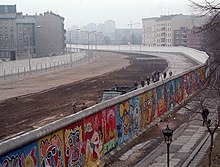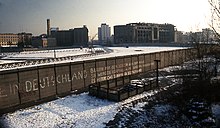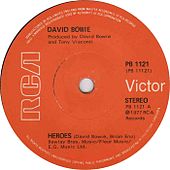"Heroes" (song)
| "Heroes" | |
|---|---|
| David Bowie | |
| publication | 23rd September 1977 |
| length | 6 min 7 s / 3 min 32 s |
| Genre (s) |
Art-Rock Experimental |
| Author (s) | David Bowie , Brian Eno |
| Producer (s) | David Bowie, Tony Visconti |
| Label | RCA Records |
| album | "Heroes" |

“Heroes” is the title of a song by David Bowie . The piece, published in 1977, is about two lovers who meet in the shadow of the Berlin Wall . The title was created in West Berlin as part of Bowie's Berlin trilogy and is one of the few internationally known pop songs about the Berlin Wall.
Emergence

Written by Bowie and Brian Eno , the piece was produced by Bowie and Tony Visconti . It was released both as a single and as the title track of the album of the same name . The song was recorded in both a German and a French version as “Heroes” / “Helden” and “Heroes” / “Héros” respectively. The song is a product of Bowie's fertile Berlin period. The quotation marks are part of the song title and should express a certain ironic distance from the romantic - pathetic lyrics.
The recordings were made between July and August 1977 in Hansa-Tonstudio 2 , which was located just under 200 meters from the Berlin Wall and, as a studio by the wall, was of particular importance in music history. From the producer's seat you could see a watchtower of the GDR border troops and, according to Iggy Pop , who recorded Lust for Life there that same year , the border guards occasionally waved down into the studio.
According to Bowie, the formative inspiration for the song was on the one hand a painting by Otto Mueller with a similar motif, and on the other hand the sight of lovers kissing in the shadow of the wall. Producer Tony Visconti claimed to have created the picture when he hugged the singer Antonia Maass and Bowie happened to look out the window of the Hansa Studios. Bowie described the scene on the New Musical Express in November 1977 as follows:
“It's a wall next to the studio. It's about 20 to 30 meters away from the studio and the director is looking directly at it. A gun turret sits enthroned on the wall in which the guards sit, and every lunchtime a boy and a girl met below. They had an affair. And I thought: Of all the places where you can meet in Berlin, why do you choose a bank under a watchtower on the wall? "
Immediately after its release, Bowie said the song's protagonists were an unknown couple, but according to Visconti, who was married to Mary Hopkin at the time , Bowie only pretended to do so to protect him. Bowie confirmed this in 2003. Maaß, who at that time also recorded in the Hansa studio with her jazz rock band Messengers , says, however, that her affair with Visconti had not even started when “Heroes” was created.
The team that recorded the entire album “Heroes” was essentially identical to the one that had recorded Low a few months earlier - also in the Hansa studios. Eno only mediated the musicians with Robert Fripp , whom they deliberately shoved into the deep end. Most of the time he didn't know the piece before the studio began recording, and then he started improvising guitar parts into it. Maaß sings in the background choir.
Music and lyrics
title
The title is a reference to the 1975 track Hero from the album Neu! '75 of the German Krautrock band New! who was admired by Bowie and Eno. It was one of the first recordings on the album, but remained purely instrumental until the end of production.
Bowie put the title in quotation marks to denote the irony of the situation described in the otherwise highly romantic song full of pathos and idealism .
music
“Heroes” is a mixture of many poppy hooklines and a melodic voice leading in front of a synthesizer influenced by progressive rock and avant-garde- influenced sounds and tone changes in the music. The music written by Bowie and Eno is a wave-like swell and swell of humming guitars, percussion and synthesizers, often described as Phil Spector's wall-of-sound effect . “Heroes” is also heavily influenced by the song Marcella , written by Brian Wilson , Jack Rieley and Tandy Almerund and released in 1972 on the Beach Boys album Carl and the Passions - “So Tough” .
The basic track of the piece consists of a conventional arrangement of piano , bass , guitar and drums . The other musical additions are striking, however. They consist mainly of synthesizer pieces by Eno, a low-frequency hum with clock frequencies of three oscillators to create a flutter effect. The King Crimson guitarist Robert Fripp created an unusual sound by feedback from his guitar in different positions in the room to control a modulation of the feedback. The instrumental solo before the central dolphin verse is based closely on Emerson, Lake and Palmer's song Lucky Man , which is about chivalry.
Visconti installed a system of three microphones, one about 23 cm from Bowie, one six meters and another 15 meters away. For the quiet parts of the song, only the two in Bowie's vicinity were initially controlled - and for the louder parts, so that the reverb and surroundings were created, all three. The acoustics resemble an echo chamber with a characteristic reverberation effect.
text
While most of the album “Heroes” was created by spontaneously singing something to the music, he wrote the song “Heroes” conventionally. Eno, Visconti and Bowie worked out eight minutes of music that arose from a chord progression. Bowie sent the others out of the studio to write the text down.
The text describes the encounter and relationship of a couple in the shadow of a wall, apparently the Berlin Wall . Bowie tells him about the couple from the man's point of view. It starts out as a relatively conventional love story. In the first stanza he emphasizes love, even if there are obviously opponents: “We can beat them”, but also the fleetingness and relevance of love to the present: “We can be heroes just for one day”. The second stanza remains in the inner view and emphasizes that love is unconditional and is not restricted by unpleasant behavior - “You can be mean and I'll drink all the time”. The third stanza, which is separated from the rest of the song by two longer instrumental parts, gives it a more comprehensive character. Here Bowie leaves the direct narrative level for the first time and uses symbols: “I wish I could swim like Dolphins can swim”. This is followed, an octave higher than at the beginning and almost screamed, the first stanza again, but with a much greater urgency due to the presentation. The next stanza finally relocates the previously relatively open story to “the wall” and “guns shot above our heads”. Clearly political connotations come into play through this stanza . The drama increases. The freedom of the swimming dolphin contrasts with the confinement of the wall, the fleeting presence of the chorus “we could be heroes just for one day” contrasts with the finality of the death threat from the guns. The superiority is clearly on the side of the lovers, because: “Oh we can beat them, for ever and ever”, because the shame lies on the side of the gun bearer. What begins as a love story becomes a universal statement about the victory of feelings and cohesion over repression and weapons.
The image of king and queen and the chorus half-line "just for one day" play on the prose poem royauté from Les Illuminations by Arthur Rimbaud at.
The German text of “Heroes” / “Helden” , which Bowie sings in the middle of the song, comes from Antonia Maaß. On a spontaneous idea from Visconti, his girlfriend at the time Maaß drives to Blonay , where Bowie is staying. Her English is not good, and she translates the song into words Bowie can handle as well as possible and tries to teach him how to pronounce German. Due to his lifestyle there, according to Maaß “a totally orgiastic life”, she tries to keep her stay as short as possible and she doesn't care about royalties either. The German text deviates significantly from the English original in some points and uses rather unusual constructions. For example, from
"Standing by the wall [...] And the guns shot above our heads [...] And the shame was on the other side"
"The wall in the back so cold [...] shots tear the air [...] the shame fell on her side."
Video
In contrast to the confusing audio composition, Nick Ferguson's video clip was a simple and matter-of-fact affair. The singer was recorded by various cameras in the backlight only while he was singing; the technique produced a monotonous and almost silhouetted effect.
Publication and follow-up time

The record company shortened the song for the single release from six to three and a half minutes to make it more attractive for radio broadcasting . The first two stanzas and thus the slow build-up and the gradual expansion of the focus were omitted; the single version started directly with the dolphins.
Although RCA spent considerable advertising and Bowie appeared again for the first time since 1972 on Top of the Pops , it brought the song after its release on October 14, 1977 in the UK Top 40 only to # 24; in the US, it didn't even get on the Billboard Hot 100 . In the long term, however, it prevailed; The first sign of this was that Melody Maker chose the album of the same name as album of the year.
Bowie often sang the song live, in particular the appearance on Live Aid 1985 gave the song the breakthrough as a Bowie anthem. "Heroes" was published in a variety of languages and lengths (according to Roy Carr and Charles Shaar Murray, "a collector's wet dream"). There are bilingual versions in English / French and English / German.
Cultural influence
In Germany in particular, it received increased attention from the 1981 film Christiane F. - Wir Kinder vom Bahnhof Zoo ; it is often still associated with this film. Christiane F. is a Bowie fan in the film, Bowie himself appears at a concert, the soundtrack consists of songs from the Berlin trilogy. “Heroes” / “Helden” underlies an important action scene in the film. Cut like a music video, you see a group of young junkies stealing money from a lottery booth and then chasing the police.
The video game developer EA Sports used the song in the 1998 ice hockey simulation NHL 99 as the soundtrack for the opening video .
The German version was covered by Apocalyptica together with Till Lindemann , by Nena , MIA , last instance of Goethe's heirs , and Annett Louisan, among others . The German band Wir sind Helden often cites the Bowie song as an inspiration for the band name, but has never confirmed that it is named after him.
Vodafone used the song in a commercial in 2009 on the occasion of the integration of the fixed line subsidiary Arcor and a related change in marketing . The song was sung in this case by the Icelandic rock singer Ragnar Sólberg.
Peter Gabriel chose “Heroes” for his 2010 album Scratch My Back , on which he gathers cover versions of various artists. He sang it on November 9, 2014 at the celebration of the 25th anniversary of the fall of the Berlin Wall at the Brandenburg Gate .
In the first episode of the TV show The Voice of Germany , a bilingual version, Heroes / Helden , was sung on November 24, 2011 by jury members Nena , Xavier Naidoo , Rea Garvey and Alec Völkel / Sascha Vollmer ( The BossHoss ). The song was released as a single that same evening, and this interpretation made it into the German single charts for the first time . After Bowie's death in January 2016, the original version entered the German charts.
In the film Maybe Better Tomorrow (2012) the song can be heard in a key scene and is henceforth referred to as the "tunnel song" by the protagonists. The actual title is not resolved.
In the 2013 film Horns , “Heroes” is used as a motif of the protagonist's longing for his murdered girlfriend.
Motörhead recorded the song shortly before Lemmy Kilmister's death in 2015 . This version appeared on the album Under Cöver in 2017 and was selected as the official anthem for the Wacken Open Air 2018.
The song also plays a role in the Red Ribbon Club series . In the first season it helps to wake one of the protagonists out of the coma. In the second season, “Heroes” is used for another coma patient, but this does not wake her up.
In 2019, a cover version of the Hollywood Vampires ( Alice Cooper , Johnny Depp and Joe Perry ) appeared on the album Rise , which was released on June 21, 2019; the song is sung by Johnny Depp.
In the final scene of the Oscar-winning film drama Jojo Rabbit from 2019, the two protagonists of the film, the former Hitler Youth Johannes and the previously hidden Jew Elsa, dance together to heroes on the street after the end of the war .
Leaderboards
The American music magazine Rolling Stone performs "Heroes" at number 46 of the 500 greatest songs of all time . In the selection of the 500 best songs of the New Musical Express, it ranks 15th. Pitchfork Media selected “Heroes” as number 6 of the 200 best songs of the 1970s. Time magazine included him in the list of the 100 greatest songs.
occupation
production
- Tony Visconti : producer
- David Bowie : producer
- Colin Thurston: sound engineer
Musician
- David Bowie : vocals, piano, ARP Solina String Ensemble , Chamberlin , percussion
- Robert Fripp : lead guitar
- Carlos Alomar: rhythm guitar
- George Murray: Bass
- Dennis Davis: drums
- Brian Eno : synthesizer, analog synthesizer ( EMS VCS 3 )
- Tony Visconti : backing vocals, tambourine, percussion
Web links
- “Heroes” Song Lexicon, October 8, 2013
- Lyrics on LyricWikia
literature
- David Buckley: Strange Fascination - David Bowie: The Definitive Story . Virgin, London 1999, ISBN 0-7535-0457-X .
- Tobias Rüther: Heroes. David Bowie and Berlin, Rogner & Bernhard, Berlin 2008, ISBN 978-3-8077-1031-0 .
- Roy Carr, Charles Shaar Murray: David Bowie: An Illustrated Record . Avon, New York 1981, ISBN 0-380-77966-8 .
Individual evidence
- ^ John Connell, Chris Gibson: Sound Tracks: Popular Music, Identity, and Place . Routledge, 2003, ISBN 0-415-17028-1 , p. 104
- ↑ Lars von Törne: David Bowie's mythical years in Berlin . In: Der Tagesspiegel , November 18, 2008
- ↑ a b Buckley, pp. 323-326
- ↑ a b c d e f Tobias Rüther: The song of the end and its beginning . In: Frankfurter Allgemeine Sonntagszeitung , November 16, 2008, p. 32
- ^ A b Nicolas Pegg: The Complete David Bowie . Reynolds & Bearn, London 2000, ISBN 1-903111-14-5 , pp. 90-92
- ↑ a b Buckley, pp. 49-50
- ^ Mat Snow: Making Heroes . In: MOJO. 60 Years of Bowie , 2007, p. 69
- ^ A b Roy Carr, Charles Shaar Murray: Bowie: An Illustrated Record . 1981, pp. 90-92
- ^ NME Interview 1977 with Charles Shaar Murray ( Memento of August 11, 2004 in the Internet Archive ); from: Bowie: Golden Years , February 20, 2007
- ↑ a b c d e James E. Perone: The Words and Music of David Bowie . Greenwood Publishing, 2007, ISBN 0-275-99245-4 , pp. 67-69
- ^ A b Richard Buskin: "Classic Tracks: Heroes" . In: Sound on Sound , October 2004 issue
- ↑ “Dear friends, I want her to be queen!” - “I want to be queen!” (…) “They fell into each other's arms, as if passed out. Indeed, they were king and queen for a whole morning, during which the purple hangings on the houses rose again, and for the whole afternoon, in which they directed their steps towards the palm gardens. "Arthur Rimbaud: Royauté , translated by Walther Küchler. In: All the seals . Lambert Schneider, Heidelberg 1997, p. 200 f.
- ↑ Shane Blackman: Chilling out the cultural politics of substance consumption, youth and drug policy. Open University, Maidenhead 2004, ISBN 0-335-22430-X , p. 62
- ↑ Last instance: Das Weisse Lied on laut.de , accessed on January 12, 2016
- ↑ InnExtremoo: Goethe's heirs - heroes live. October 7, 2016, accessed February 24, 2017 .
- ^ The Voice Of Germany jury: "Helden / Heroes" video premiere Promicabana.de, from November 24, 2011; accessed on January 12, 2016
- ↑ Casting Shows vs German Rap Battle on germanchartblog, accessed on January 20, 2012
- ↑ David Bowie - Heroes. officialcharts.de
- ↑ 500 Greatest Songs of All Time on Rolling Stone (accessed November 17, 2018)
- ↑ The 500 Greatest Songs Of All Time on New Musical Express , accessed November 17, 2018
- ↑ The 200 Best Songs of the 1970s on Pitchfork Media (accessed November 17, 2018)
- ↑ All-TIME 100 songs on Time (accessed November 17, 2018)

